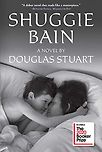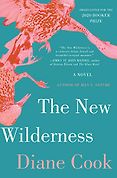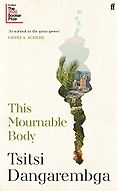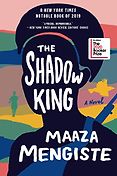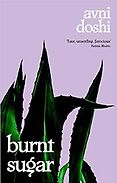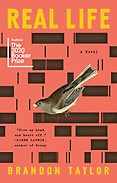The Booker Prize seeks to reward the best novel of 2020 with a £50,000 ($64,000) prize. Has it been a vintage year, in terms of the quality of submissions?
This is the first year I’ve been a judge for the Booker Prize, so I can’t compare it in that way. Of our 162 submissions, there were some books that we knew early on were not perhaps of a high enough standard to last the course, as it were. But I have a strange way of seeing things, because as a former publisher, former editor, I know that every single title that we read has been championed by an editor and publisher who thinks it is a brilliant book, and so I bear in mind that there is something attractive about every single submission to make that editor or publisher feel it deserves a wider audience.
Another aspect is that sometimes, as a judge, you are reading things that are not quite finalised – they’re at proof stage, and you might spot little mistakes that will obviously be ironed out of the finished product. It has been quite a mammoth but exciting task – there’s an awful lot of reading, and a huge number of books that you have to judge into some sort of hierarchical order.
Get the weekly Five Books newsletter
Of 162 books, you will have to get rid of more than 90% – although that’s not the right terminology; you have to say, ‘Well, it’s not your time.’ That is sometimes difficult because there are a lot of things that are engaging for different people, different readers, different judges, for different reasons. If you don’t all agree, then you’re going to have to let go of some books you might otherwise have wanted to see go forward. If each judge had been choosing a shortlist individually, we probably wouldn’t have come up with identical lists. Who knows? But these are the books we all stand behind. I think it’s been a really exciting process: trying to get to know our fellow judges at this remote distance – because we’ve never all met in a room together.
Of course. It must have been a very different experience to be a Booker Prize judge in 2020, with all the Covid-related measures in place.
Yes, it’s such an unusual time. You know, we’ve never had to do this before so it’s almost been a matter of making it up, making it work as we go along. I’m really looking forward to getting together with my fellow judges at some future point over a cup of coffee or something – when we can give each other a hug. So many things are difficult to do by Zoom, when you’re staring at yourself.
I’ve seen a bit of discussion about both the long- and shortlists – that they have been very heavy on debut books. Was that a purposeful decision on the judges’ part?
It was always about the books, rather than the writers – because it was only after we had decided on the books that we came to analyse them in that way. We certainly didn’t set out to foreground women, debut writers or independent publishers, nor did we say ‘let’s have a quota for British writers,’ or anybody else.
So, if it’s diverse shortlist, that’s just how it happened. Perhaps it’s diverse because we – as a group of judges – are diverse. But I think what it tells you is that these things happen organically – you don’t say ‘let’s shine a light on a particular type of writer’, you just have to say, ‘let’s choose the books that we actually feel have the best writing quality and subject matter, and that we want to champion.’ We didn’t check passports or work permits or birth certificates. We read the books.
Well, let’s get onto these six novels, all shortlisted for the title of the best fiction book of 2020. Shall we start with Diane Cook’s The New Wilderness? It’s a dystopian novel about a mother and daughter attempting to coexist with nature in a post-climate change world.
It’s a very humane portrait of motherhood and what it means to be human. It’s a future shock novel, an urgent novel reflecting where we are now and what’s happening in society now. It’s wonderfully imagined and written, particularly in how it deals with intimate relationships, but also how it handles broader themes: the characters are driven by each other, and by the environment. They get wilder and wilder, but there’s this loving relationship between mother and daughter – loving and punishing.
We loved the writing, and it wasn’t hard to see ourselves in that context, and to relate to it. The way the writing and the imagination come together make it work.
We’ve discussed climate change fiction, sometimes known as ‘cli-fi’, on our site a few times, and one feels that it, as a genre, grows ever more pressing and relevant. Is it a theme that you saw much of this year among the submissions?
Yes, in fact we had many novels that dealt with climate change, whether set in the past or a dystopian future, but also many books with themes such as mother-child relationships, and intimate relationships broader in scope than the family setting. I’m not sure why, but this seemed very relevant in lockdown, with each of us in our bubble, yet being very aware of the problems and politics of the wider world, including the backdrop of the Black Lives Matter movement, and the international demonstrations against global inequities that were heightened by lockdown. Whether you’re in Wyoming as Lee [Child, one of the 2020 Booker Prize judges] is, or in London where I am, we’re all being impacted by the world outside. So all of these things have fed into why certain themes or voices have perhaps resonated more, combined with high quality of writing.
Let’s move on to Tsitsi Dangarembga’s This Mournable Body, the second book in the running for the title of best novel of 2020. Dangarembga is currently facing trial in Zimbabwe for protesting against the current government there.
In a way, that exemplifies how broader politics can be connected with the creativity of an individual. We found This Mournable Body to be a haunting and heartbreaking novel. It features the breakdown of the female protagonist as well as the breakdown of the country, and the ways in which they are linked. It’s written in an unusual second-person style, which is kind of cinematic and works brilliantly. It’s both an intimate story and a universal story: about an intelligent person having to deal with, and being enmeshed in, the mediocrity of what’s around her, the injustices, and yet having to keep going somehow through it all.
It’s the final instalment in a trilogy that started three decades ago with her very highly acclaimed Nervous Conditions.
Yes, but in a way one doesn’t even have to know that it’s part of a trilogy. The book stands alone, in my opinion. It’s a novel that deals with the same central character that was in the author’s first novel, which was – as you say – published in the eighties. So This Mournable Body is historical, but is also contemporary, in terms of its scope.
“We didn’t check passports or work permits or birth certificates. We read the books”
That’s one of the interesting things about the novels on the shortlist – many of them seem to be dealing with more contemporary society than with the historical.
Except, perhaps, for our next title: The Shadow King by Maaza Mengiste.
Yes, exactly. This is a historical novel about what it means to be a woman in a war.
Right. It’s set in 1930s Ethiopia during the Italian invasion.
It casts a light on women soldiers whom we don’t know much about in terms of African and European history, but who actually played a crucial part in their societies. The novel is brilliantly researched, and lyrical in the way the author describes the characters. It’s hard not to be drawn in, and totally convinced by her writing.
It is a historical take on the world that is as compelling as the contemporary stories. I’m glad that the shortlist does have this mix of the historical and the contemporary, because that is where we are situated. Our history affects our present in ways we can’t escape. The moment we are in now is informed by history, and will also inform our future. A writer’s imagination, craft, and subject matter can transport us through time.
Next up we have Avni Doshi’s Burnt Sugar (published in some territories as The Girl in White Cotton), another study of mother-daughter relations. The older woman traded an unhappy marriage for life in an ashram and on the streets, with her daughter in tow. And now, in her fifties, she is losing her memory.
Yes, a very compelling and unusual mother-daughter story that is not always comfortable. I think the title, Burnt Sugar, is telling, because there’s an indication that there might be some bitter taste left in the mouth. It’s an author who is really pushing against the reader’s sympathies – and it’s beautifully written and imagined, emotionally engaging and poignant.
It’s a sort of love story, a story of love and betrayal, but it happens to be between a mother and a daughter. A story of contemporary India, and it’s a difficult story but beautifully told. It’s very unsentimental, not a sugary mother-daughter story.
It begins: “I would be lying if I said my mother’s misery has never given me pleasure.” She’s quite ambivalent.
Ambivalence, yes, that’s it.
The next book I want to ask you about also deals with a complicated mother-child relationship. This is Shuggie Bain, by Douglas Stuart. Why is it in the running for title of the best novel of 2020?
This is written by a Scottish writer and set in 1980s, Thatcher-era Glasgow. It’s about the poignant connection between an unusual child and his mother, set in a marginalised community.
It’s tender and upsetting at the same time; but hopeful in the way it looks at family and desire. It’s one of those books, like others on this shortlist, where once you have engaged with the characters they will be hard to forget. It’s full of both heartwarming and heartbreaking situations. The author has pulled it off so well, it’s amazing to think that it is a debut.
Yes. Stuart is a Scotsman, but he’s been living in New York for some time, and this book was published first in the US – so although it’s only recently out in the UK I have been aware of the acclaim it has been gathering there.
British commentators have really focused on the American aspect of our shortlist, though the fact is we did have British authors on the longlist, and there were many excellent stories set in Britain that were hard to let go of, and which I’m sure the judges will champion in other ways. But – and I’ll reiterate here what I’ve said elsewhere – when you start to read a book, you’re not thinking, ‘Where does this writer live? Was this writer born in Britain?’ I think it’s misleading to try to erect such literary walls. All the books on the shortlist are published by British publishers; I wouldn’t say they are displacing British writers, or British-born writers, or white-British writers, or writers living in Britain. It would narrow things down if you started to worry about where each writer is based, or born, or has travelling to or from, before reading the books. I didn’t know when I read Shuggie Bain what its author’s connection was with America.
But it just so happened that our shortlist this year has highlighted these themes and literary energies. It tells you something about what British publishers are looking for, perhaps.
Do you think that this debate over the Booker’s relatively recent inclusion of American writers betrays some kind of insecurity on the part of the British literary establishment?
It may be a sort of insecurity – the assumption that everybody out there is going to be better than us; ‘us’ being the British. But you don’t have to stay put in Britain, as a British writer, and British writers are informed by the rest of the world. We shouldn’t try to put a border around one writer or one country or one prize, to protect its interests. I think every writer who has a possibility of winning or being shortlisted will be considered, so long as they are published by a British publisher. I don’t see why one should worry about it. I mean, you might as well say ‘British publishers shouldn’t publish so many American writers.’ That would be crazy.
Well, one very good American writer who we should talk about is the author of the final title on our shortlist for the title of best novel of 2020. This is Brandon Taylor and Real Life. It’s a contemporary campus novel.
It’s a new take on the campus novel. Another author who’s somehow pulled off this brilliant book on his first go. Well, the thing with debut writers is that you don’t know how many novels they’ve tried before this first one was published. Real Life is about the racism, homophobia and alienation faced by a young man from Alabama, going to a Midwestern university to do a biochemistry degree – the micro-aggressions he faces on a daily basis, and how he maintains his own identity. It’s deeply affecting and emotional, examining desire and pain and grief, memory and fantasy, things from the protagonist’s childhood, as well as the present – while asking the question: ‘What is real life, anyway?’
Five Books interviews are expensive to produce. If you're enjoying this interview, please support us by donating a small amount.
It’s a skilfully written book that isn’t necessarily always easy to read, isn’t always painless. But it’s fresh and compelling and it well deserves its place on the shortlist.
Overall, taking the six novels on your 2020 shortlist as the best bellwether we have, how do you feel about the state of contemporary fiction?
These books have demonstrated their power to engage and entrance five very different judges, and made us care about what happens next. You know, there are so many books that we’ve had to say goodbye to, and there’s a lot of interesting material in those books. I hope that people will read more than six novels a year, because there are so many books being published every week – as you know – and different books serve a wide, global readership. So we’re not saying, don’t read anything else; we’re saying, yes, read these six books – in fact, read the 13 on the longlist – and definitely read the one that eventually wins.
Get the weekly Five Books newsletter
But when you’ve finished that, listen – there are other books you will also enjoy. Many publishers on this list – and many publishers not on this list – have been producing books that should be reaching a bigger audience. So I think rather than focus on the books on this list, we can all champion and enjoy and share the books we care about. It shouldn’t be about saying ‘read this’ and ‘don’t read that’ – just keep reading.
As a species we have always told stories to define our existence and for these reasons, we must all just keep on reading, learning and sharing to develop our innate love of the word.
Why not start with these books?
Interview by Cal Flyn, Deputy Editor
October 2, 2020. Updated: December 4, 2024
Five Books aims to keep its book recommendations and interviews up to date. If you are the interviewee and would like to update your choice of books (or even just what you say about them) please email us at [email protected]

